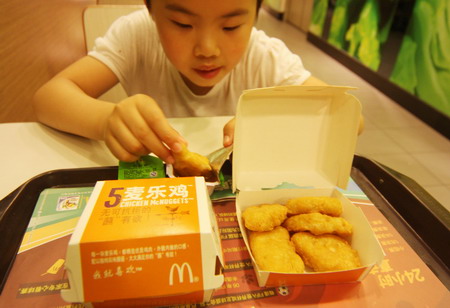-
News >China
Chicken nuggets safe, McDonald's assures public
2010-07-06 07:13
A boy eats Chicken McNuggets at a McDonald's restaurant in Beijing on Monday. [China Daily]
SHANGHAI - Following a CNN report in late June that claimed US McDonald's chicken nuggets contain traces of two "harmful" chemicals, the fast food giant's China division admitted on Monday that its McNuggets also contained the additives.
However, McDonald's (China) Co Ltd assured its use of the two additives is "safe and harmless" to customers' health.According to the CNN report, the fast food chain's nuggets served in the US contain preservatives of tertiary butylhydroquinone (tBHQ), a petroleum-based product, and dimethylpolysiloxane, an anti-foaming agent.
Public fears in the US soon spread to China, as domestic media went wild with the story.
In a bid to calm the nerves of its Chinese consumers, McDonald's responded with a statement late on Monday, saying the McNuggets, which though contain the two additives, are safe to eat.
"Their contents of tBHQ and dimethylpolysiloxane are as low as 200 ppm (parts per million) and 10 ppm respectively, which totally fulfill the standards for food additives by Chinese regulation," said the statement. "The food McDonald's supply does no harm to consumer's health."
Media reported that the McNuggets served in the United Kingdom were found free of the use of the two chemicals.
According to the company's announcement, dimethylpolysiloxane is an anti-foaming agent similar to rubber. The reason for its use is to prevent the oil from foaming, while tBHQ is a preservative for vegetable oil and animal fat.
Chen Yi, a middle school student, said he will avoid eating McDonald's food.
"I don't think I will come here as often as I used to," said Chen as he bit into a cheeseburger at a McDonald's chain in downtown Shanghai.
McDonald's has developed a broad client base in China, with 1,135 stores on the Chinese mainland by the end of last year. It enjoys high popularity among youngsters who appreciate its convenience, hygiene and energetic corporate culture.
Dong Jinshi, a food safety expert with the China National Center for Quality Supervision and Test of Environmental Protection Products, said the use of dimethylpolysiloxane is regarded as safe and non-toxic in the food industry.
But Dong stressed that the use of such an additive should be within 0.1 gram in each kg of food, and the cooking temperature should be controlled between -50 degrees and 200 degrees.
Liu Qingchun, deputy director of nutrition at the General Hospital of Armed Police Forces, said Chinese food additive standards do not forbid the usage of tBHQ, but its dosage is limited, with a maximum of 0.2 gram for a kg of food.
"The chemical is toxic to some extent and its abuse will lead to cancer," he warned.
Both experts said additives are an indispensable part of food processing, and food cannot be produced, shaped or stored without additives.
"Although the additives are safe as they are used according to China's food safety standards, customers should bear in mind that eating a particular food for a long time is not safe, as the additives will accumulate to a dangerous level," Dong said.
